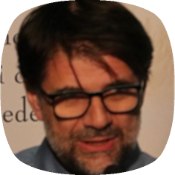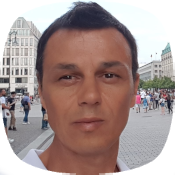Track 1 - Information Technology in Automation
Track Chairs |
|---|

Wolfgang KastnerTechnische Universität Wien, Austria
Alois ZoitlJohannes Kepler Universität Linz, Austria |
Download Call for Papers |
|---|
Click here to download the track cfp.
Complete Details |
|---|
Click here for complete details of the track.
Focus |
|---|
The track focuses on developing, adopting, and applying information technology (IT) for automation systems
Topics under this track include (but not limited to) |
|---|
- IT Modeling Techniques for Automation Systems
- Model Driven Development and Model-Based Engineering in Automation and Mechatronic Systems
- Data Modeling along the Plant Life Cycle
- Domain Specific Modeling and Programming Languages
- Knowledge-Based Systems, Ontologies, and Semantic Web in the Engineering of Automation Systems
- IT System Architecture Techniques in Automation Systems
- Vertical Integration, Integration with MES and ERP Systems
- Information Technology/Operation Technology Convergence
- Digital Twins
- Automation Systems and the Circular Economy (Product Pass)
- Industrial Internet of Things
- Energy Management in and by Automated Systems
- Engineering Methods for Distributed Automation Systems
- Cyber-Physical (Production) Systems
- Software Reuse, Software Product Lines, Managing Variability, and other Software Engineering Methods in Automation
- Dynamically Reconfigurable, Adaptive and Emergent Automation Software/Systems
- AI and ML in Automation
- Security and Safety in Automation
- Case Studies and Application Reports on these Topics
Track 2 - Industrial Communication Technologies and Systems
Track Chairs |
|---|

Svetlana GirsMälardalen University, Sweden
Claudio ZuninoNational Research Council of Italy, CNR-IEIIT, Italy |
Download Call for Papers |
|---|
Click here to download the track cfp.
Complete Details |
|---|
Click here for complete details of the track.
Focus |
|---|
The track is focused on industrial communication technologies, including tasks such as modeling, analyzing, and synthesizing provably correct systems, as well as characterizing application requirements, implementing solutions, evaluating performance, conducting validation, and presenting case studies
Topics under this track include (but not limited to) |
|---|
- Industrial networks
- IP-based and web-based industrial communications
- Integration and interoperability of automation networks
- Middleware for industrial communications and decentralized control
- Software-Defined Networks and cognitive radio networks
- Wireless instrumentation and wireless sensor networks
- Mesh, relay, and multi-hop industrial networks
- Wireless coexistence, spectrum-sharing and radio resource management in industrial environments
- Dependability, fault tolerance, and safety in industrial networks
- Information security in industrial communications
- Industrial Internet of Things (IIoT)
- Machine-to-machine (M2M) communications
- Communication technologies for Industry 4.0
- Remote configuration and network management
- Real-time communication and precise synchronization
- Event-driven and time-triggered communications
- Quality of Service (QoS) and performance indexes
- Time-Sensitive Networking
Track 3 - Real-Time Systems and Applications
Track Chairs |
|---|

Mohammad AshjaeiMälardalen University, Sweden
Mitra NasriEindhoven University of Technology, Netherlands |
Download Call for Papers |
|---|
Click here to download the track cfp.
Complete Details |
|---|
Click here for complete details of the track.
Focus |
|---|
Industry is increasingly permeated with embedded systems that often require to act within a bounded time. Moreover, complex functionality and adaptivity is becoming more essential in designing such embedded systems. Embedded systems can also connect via heterogeneous communication systems to create complex distributed embedded systems that require careful design to fulfill their requirements, such as time, safety, resource efficiency, and security requirements. This track focuses on challenges that arise during designing such systems with the emphasis on meeting their timing requirements along with other requirements such as reliability, safety, etc.
Topics under this track include (but not limited to) |
|---|
- Real-time analysis and performance modelling
- Analysis and empirical evaluations
- WCET analysis
- Worst-case performance analysis
- Multi/many-core/SoC embedded systems
- Adaptive real-time systems
- Edge and cloud architectures and applications
- Dependable systems including safety and criticality
- Security issues in embedded systems design
- Privacy-enhanced systems
- QoS for embedded systems
- Wireless sensor (and actuator) networks
- Industrial IoT systems
- Wired industrial communication systems (PROFINET, TSN, EtherCAT)
- Software defined networks and systems
- Software development for embedded systems
- Design tools and methodologies for embedded systems
- Verification and validation techniques
- Formal modelling and methods
- (Self)-reconfigurable real-time systems
- Mixed-criticality real-time systems
- Reliable and fault tolerant real-time systems
- Energy and performance optimization
- Hardware-software integration and co-design
- Industrial case studies of real-time systems
- System and deployment experiences
Track 4 - Automated manufacturing Systems
Track Chairs |
|---|

Ricardo J. RodríguezUniversity of Zaragoza, Spain
Michael WeyrichUniversity of Stuttgart, Germany |
Download Call for Papers |
|---|
Click here to download the track cfp.
Complete Details |
|---|
Click here for complete details of the track.
Focus |
|---|
The track is focused on the use of techniques and technologies for modelling, analysis, intelligent control, and enterprise integration of automated manufacturing systems.
Topics under this track include (but not limited to) |
|---|
- Autonomous manufacturing systems
- Asset Administration shell for digital twin
- Biointelligent Manufacturing Automation
- LLM for automation in manufacturing
- Skill based Automation
- Circular Economy Concepts through Autonomous Production
- Industry 4.0 and 5.0 technologies and its applications to automated manufacturing
- Optimization, flexible management and self-adaptive manufacturing
- Performance evaluation and reliability of discrete and continuous industrial automation systems
- Software-defined manufacturing systems and enterprise integration
- Best practices for Digital Twin in automated manufacturing
- Data spaces for track and trace of value chains in production
- Intelligent Cyber-Physical Production Systems
- Standardization of modelling, software and control in automated manufacturing
- Condition monitoring, predictive maintenance, and fault diagnosis
- IT for networked and distributed manufacturing systems
- Design and application of IT architectures, e.g., service-oriented technologies
- Synthesis, modelling and analysis of manufacturing systems
- Test cases, benchmarks, methods and validation and verification tools
- Methods and tools for safety and security in automated manufacturing
- Scheduling, resource allocation and optimization
- Discrete Event Systems in manufacturing
- Special applications and experiences in industry
Track 5 - Industrial Control
Track Chairs |
|---|

Takao SatoHyogo University, Japan
Antonio VisioliUniversity of Brescia, Italy |
Download Call for Papers |
|---|
Click here to download the track cfp.
Complete Details |
|---|
Click here for complete details of the track.
Focus |
|---|
This track is focused on the critical issues in industrial control. Industrial control addresses the use of sensors, metrology, and algorithms to monitor equipment, processes, and products to provide actionable information for maintenance and control. The successful application of industrial control draws from the domain expertise of multiple disciplines that are typically responsible for delivering separate elements of the complete solution, such as IT/factory automation, process technology, control engineering, yield management, safety engineering, etc.
Topics under this track include (but not limited to) |
|---|
- Process Monitoring and Control
- Equipment Monitoring and Control
- Supervisory Control
- Intelligent Control
- Process Modeling and Optimization
- Control Performance Assessment
- Industrial Internet of Things
- Industrial Control Applications
- Computer Implementation of Control Systems
- Safety Issues in Industrial Control
- Environmental Implications of Control Systems
- Fault-Tolerant Control Systems
- Event-Based Control Design
- Control of Processes with Delay
- Digital Twins for Control Systems
- Security and Privacy of Control Systems
- Diagnosis of Control Systems
- Adaptive and Learning Control
- Guidance Control
- Data-Driven Control
Track 6 - Computer Vision and Human-Machine Interaction in Industrial and Factory Automation
Track Chairs |
|---|

Giancarlo IannizzottoUniversity of Messina, Italy
Javier Silvestre-BlanesUniversitat Politècnica de València, Spain |
Download Call for Papers |
|---|
Click here to download the track cfp.
Complete Details |
|---|
Click here for complete details of the track.
Focus |
|---|
The track focuses on cutting-edge and current research in computer vision, activity and object detection/recognition and human factors for Human-Machine Interaction in industrial applications.
Topics under this track include (but not limited to) |
|---|
- Computer vision systems
- Machine vision technology for flexible factory automation
- Image and video processing, analysis and interpretation
- Monitoring and surveillance
- Vision-based human-machine interaction
- Multimodal communication
- Human activity and behavior understanding
- Human-machine interface design and evaluation
- Virtual, mixed, and augmented reality
- Mobile, wearable and ubiquitous computing
- System and user evaluation
- Information visualization
Track 7 - Intelligent Robots and Systems
Track Chairs |
|---|

Andrea BonciUniversity Politecnica delle Marche, Italy
Cristian MahuleaUniversity of Zaragoza, Spain |
Download Call for Papers |
|---|
Click here to download the track cfp.
Complete Details |
|---|
Click here for complete details of the track.
Focus |
|---|
The aim of the track is to gather researchers and practitioners to report on recent achievements and on requirements in the development of real-world intelligent robots and systems, including robot prototypes, robot programming, robotics and artificial intelligence applications, sensor data processing in robotics and intelligent embedded systems, as well as on benchmarking and usability studies.
Topics under this track include (but not limited to) |
|---|
- Environment Description, Map Building and Localization, SLAM
- Navigation, Collision Avoidance and Path Planning
- Formal methods, control theory, and artificial intelligence for Robotics
- Perception for Robotics
- Advanced Sensors and Vision Systems for Robotics
- Active Perception and Sensing
- Multi-Agent Systems, Distributed and Decentralized Multi-Robot Architectures
- Cooperative and Collaborative Robotics
- Assistive Robotics
- Intelligent Embedded Systems and Integrated Intelligence
- Cognitive Robotics
- Robot Learning and Deep Learning in Robotics
- Robot Programming and Control Architecture Design
- Arms and Mobile Manipulators
- Simulation and Models for Robotics
- Training and Education in Robotics
- Human-Robot Interaction
- Condition monitoring and diagnosis in Robotics
- Autonomous Robots and Advanced Applications
- Bio-inspired Robotic Systems
- Sustainable Robotics and Applications
Track 8 - Advanced Sensing Technologies in the Industrial Internet of Things Era
Track Chairs |
|---|

Luca LeonardiUniversity of Catania, Italy
Inés Alvarez VadilloABB Corporate Research, Sweden |
Download Call for Papers |
|---|
Click here to download the track cfp.
Complete Details |
|---|
Click here for complete details of the track.
Focus |
|---|
The track is focused on the use of smart sensor technologies and information processing for monitoring and analysis of industrial systems, factory automation systems, and related applications. The track is also focused on architectural principles, design techniques, and implementation models for networked embedded sensor systems along w ith methods for their evaluation and/or performance analysis. Experience reports and case studies making appropriate scientific and technical contributions in this area are also solicited.
Topics under this track include (but not limited to) |
|---|
- Novel components, devices and protocols for the (Industrial) Internet of Things.
- Communication protocols for sensor networks deployed in industrial scenarios.
- Low-power wireless sensor networks for the (Industrial) Internet of Things.
- Network and system architectures for networked sensing.
- Energy harvesting in sensor networks.
- Security analysis and protocols.
- Sensor data processing and data mining.
- (Distributed) Signal processing and data analytics.
- Sensor network modeling, simulation, measurements, and analysis.
- Virtual prototyping systems for mass distribution of IoT sensors.
- Network health monitoring, QoS management and dependability.
- Sensor tasking and actuation, wireless control and automation systems.
- Orchestration for the IoT-to-Edge-to-Cloud compute continuum.
- Containers and microservices in IoT application architecture.
- DevOps in IoT development and deployment.
- Industrial sensor network applications, deployment and case studies.
- Smart systems for production, optimization and green energy.
- Home and building automation, smart cities.
- Smart factories, smart grid, healthcare and precision agriculture.
Track 9 - Complex Automation Systems and Systems Engineering
Track Chairs |
|---|

Arndt LuederOtto von Guericke Universität Magdeburg, Germany
Christian NeureiterFH Salzburg, Austria |
Download Call for Papers |
|---|
Click here to download the track cfp.
Complete Details |
|---|
Click here for complete details of the track.
Focus |
|---|
The track is focused on the system level design of complex technical systems,such as industrial Cyber Physical (Production) Systems, covering the complete system life cycle emphasizing the impact of all life cycle phases on control system design, implementation, and use. It focusses on the multi-disciplinary and multi-model nature of the related engineering tasks.
Topics under this track include (but not limited to) |
|---|
- Systems Engineering, Systems-of-Systems Engineering, Systems Architecture
- Model Driven Engineering and Engineering Process Management
- Information Management in Engineering
- Humans in Engineering
- Complex Automation Systems for Cyber-Physical Systems
- Distributed Control Systems and Decision-making for Complex Systems
- Cloud and Edge/Fog Computing in Automation
- Digital Twin, Digital Shadow, Asset Administration Shell
- Large-Scale System Integration and Verification
- Scalability and Complexity Management
- Modularity, Composability and Complexity in Autonomous Systems
- Case Studies and application reports from factory and process automation, automotive applications, transportation systems, district and urban automation and systems, energy systems, eHealth automation systems
Track 10 - Artificial Intelligence for Cyber Physical Systems in Automation
Track Chairs |
|---|

Tullio FacchinettiUniversity of Pavia, Italy
Lukasz WisniewskiTechnische Hochschule Ostwestfalen-Lippe, Germany |
Download Call for Papers |
|---|
Click here to download the track cfp.
Complete Details |
|---|
Click here for complete details of the track.
Focus |
|---|
The track focuses on theoretical formulations, technical developments, practical applications, methods, and industrial case studies that leverage Artificial Intelligence (AI), Machine Learning (ML), Data Analytics, and emerging AI and ML-based technologies for the automation and optimization of Cyber-Physical Systems in an industrial context. We are seeking contributions that demonstrate how these methods can address existing challenges in the industry, such as resource optimization (energy, water, compressed air, etc.), the optimization and reconfiguration of technical systems, enabling quicker and more cost-efficient operation, providing necessary assistance in dealing with technical issues, including the detection and diagnosis of anomalies. Additionally, these contributions can assist in the secure maintenance of complex, often heterogeneous systems and the optimization of technical processes.
Topics under this track include (but not limited to) |
|---|
- Distributed Architectures for Adaptive Systems
- Autonomous Cyber-Physical Systems
- Deep Learning and Self-Optimizing Cyber-Physical Systems
- Real-time Implementation of AI in Automation
- Knowledge Representation and Ontologies
- Machine Learning for Production
- Natural Language Processing Applications in Automation
- Unsupervised Learning and Latent Representations
- Grey-box Machine Learning
- Networked Adaptive Systems
- Algorithms for Diagnosis and Repair
- Self-Configuration and Self-Optimization
- Self-Adaption and Self-Organization for Smart Factories
- Automatic System Configuration
- Dependability of Cyber-Physical Systems
- Intelligent Interfaces to Smart Distributed Systems
- AI Powered Smart Interfaces
- Industrial Conversational Agents
- Smart Cities, Smart Buildings and Smart Energy Systems
- Generative AI Based Assistance Systems for Better Decision Making
- AI based Approaches to Support Security
Track 11 - Vehicular Embedded Systems
Track Chairs |
|---|

Ramez DaoudSEAD Group, American University in Cairo, Egypt
Saad MubeenMälardalen University, Sweden |
Download Call for Papers |
|---|
Click here to download the track cfp.
Complete Details |
|---|
Click here for complete details of the track.
Focus |
|---|
Vehicular embedded systems in modern vehicles, including the next generation of automated and connected vehicles, require precise time synchronization, deterministic communication,high-bandwidth, ultra-low latency, zero congestion loss, reliability, and fault tolerance, among others. Managing the complexity involved in their modelling and development, ensuring reusability, supporting timing analysis and certification, verifying safety, security, and predictability requirements, and establishing deployment and execution mechanisms pose significant challenges. This track is dedicated to meeting these requirements and addressing these challenges.
Topics under this track include (but not limited to) |
|---|
- Model-and component-based development of vehicular embedded systems
- Models and languages for vehicle software development, e.g., EAST-ADL and AUTOSAR
- Vehicular E/E architectures, e.g., distributed, domain, centralized, zonal, etc.
- In-vehicle communication protocols, e.g., CAN, CAN/FD, CAN-XL, Automotive Ethernet,TSN
- Advanced computing platforms for vehicular systems, e.g., multi-core
- Support for timing predictability in vehicular embedded systems
- Safety, security and certification (e.g., ISO 26262) aspects in vehicular embedded systems
- Performance assessment, fault-tolerance and reliability issues in vehicular embedded systems
- Autonomous vehicles, advanced driver assistance systems, V2X communications. 5G
- Blended wired and wireless predictable communication in vehicular embedded systems,e.g., TSN and 5G
- Tool support, benchmarking and industrial case studies for vehicular embedded systems
